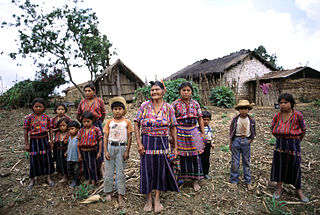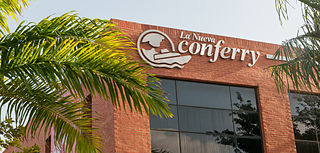
Indigenous peoples, also referred to as First peoples, First nations, Aboriginal peoples, Native peoples, Indigenous natives, or Autochthonous peoples, are culturally distinct ethnic groups whose members are directly descended from the earliest known inhabitants of a particular geographic region and, to some extent, maintain the language and culture of those original peoples. The term Indigenous was first, in its modern context, used by Europeans, who used it to differentiate the Indigenous peoples of the Americas from the European settlers of the Americas and from the Africans who were brought to the Americas as enslaved people. The term may have first been used in this context by Sir Thomas Browne in 1646, who stated "and although in many parts thereof there be at present swarms of Negroes serving under the Spaniard, yet were they all transported from Africa, since the discovery of Columbus; and are not indigenous or proper natives of America."
Aborigine, aborigine or aboriginal may refer to:

Anzoátegui State is one of the 23 component states of Venezuela, located in the northeastern region of the country. Anzoátegui is well known for its beaches that attract many visitors. Its coast consists of a single beach approximately 100 km (62 mi) long. Its capital is the city of Barcelona, and significant cities include Puerto la Cruz and El Tigre.

The Indigenous peoples of the Americas are the inhabitants of the Americas before the arrival of the European settlers in the 15th century, and the ethnic groups who now identify themselves with those peoples.
The Quijos-Quichua (Napo-Quichua) are a Lowland Quechua people, living in the basins of the Napo, Aguarico, San Miguel, and Putumayo river basins of Ecuador and Peru. In Ecuador they inhabit in the Napo Alto as well as the rivers Ansuy and Jatun Yacu, where they are also known as Quijos Quechua. The Original Nation Quijos (NAOKI) has an extension of community territory of approximately 13,986, 78 hectares. It was recognized as such on March 13, 2013, by Codenpe. Sus habitantes viven a lo largo del Alto Napo y actualmente hablan el quichua, aunque su idioma original es el shillipanu. It is made up of dozens of groups, communities and organizations, according to their status.

The Guanta Municipality is one of the 21 municipalities (municipios) that makes up the eastern Venezuelan state of Anzoátegui and, according to the 2011 census by the National Institute of Statistics of Venezuela, the municipality has a population of 30,891. The town of Guanta is the shire town of the Guanta Municipality.

Indigenous inhabitants refers to the people descended through the male line from a person who was in 1898, before Convention for the Extension of Hong Kong Territory was signed, a resident of an established village in the New Territories of Hong Kong. They have special rights to preserve their customs. When the sovereignty of Hong Kong was transferred from the United Kingdom to the People's Republic of China in 1997, these special rights were preserved under the Hong Kong Basic Law.
Article 40 of the Basic Law

The Chiapas Highlands, also known as the Central Highlands of Chiapas or Chiapas Plateau, is a geographic, sociocultural and administrative region located in Chiapas, the southernmost state of Mexico.

Australia legally has no official language. However, English is by far the most commonly spoken and has been entrenched as the de facto national language since European settlement. Australian English is a major variety of the English language with a distinctive pronunciation and lexicon, and differs slightly from other varieties of English in grammar and spelling. General Australian serves as the standard dialect.

Tlaltenango de Sánchez Román is a municipality located in the southwestern portion of the Mexican state of Zacatecas. The average elevation of the municipality is 1,723 meters (5,653 ft) above sea level and the municipality covers an area of 808.082 square kilometres (312.002 sq mi). The municipality lies in a valley bordered by the Sierra de Morones and lies on the banks of the Tlaltenango River, which runs north and is a tributary of the Bolaños River.

The Barcelona-Puerto La Cruz Metropolitan Area, better known as Greater Barcelona, is a Venezuelan conurbation formed by the localities of Barcelona, Puerto La Cruz, Guanta and Lecheria, forming one of the largest metropolitan areas of the country. Although the state's public powers are in Barcelona, its economic, social and political activities exceed its geographical limits without forming a formally established political division. It has a population of 801,071 inhabitants, being the biggest urban agglomeration in the North-Eastern Region, and the 7th in Venezuela.

Circumpolar peoples and Arctic peoples are umbrella terms for the various Indigenous peoples of the Arctic.

The Cotocollao culture were an indigenous Pre-Columbian culture that inhabited the valley that is now the Quito area, in Ecuador.
Indigenism can refer to several different ideologies associated with indigenous peoples, is used differently by various scholars and activists, and can be used purely descriptively or carry political connotations.

This is a demography of the population of Colombia including population density, ethnicity, education level, health of the populace, economic status, religious affiliations and other aspects of the population. It is the second-most populous country in South America after Brazil.

San Andrés de Machaca Municipality is the fifth municipal section of the Ingavi Province in the La Paz Department, Bolivia. Its seat is San Andrés de Machaca.

Jesús de Machaca Municipality is the sixth municipal section of the Ingavi Province in the La Paz Department in Bolivia. It was created by Law No. 2351 on May 7, 2002, during the presidency of Jorge Quiroga Ramírez. Its seat is Jesús de Machaca.

Conferry is a Venezuelan shipping company operating passenger and freight services to the islands of Margarita and Coche. Currently owned by Bolipuertos and the Venezuelan state, it serves the ports of Puerto la Cruz, Punta de Piedras, Guanta, La Guaira, Coche Island, and the international port of Guamache, The main office of Conferry is in Plaza Venezuela, in central Caracas.
The Rural Representative elections are the quadrennial elections to elect the rural representatives which consist of the village representatives and kaifong representatives in the New Territories of Hong Kong. The rural representatives are responsible for electing the executive committees of their respective rural committees in which to elect the members of the Heung Yee Kuk.
First Nations or first peoples may refer to:

















